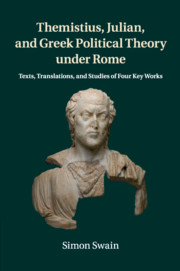 Themistius, Julian, and Greek Political Theory under Rome
Themistius, Julian, and Greek Political Theory under Rome Book contents
- Frontmatter
- Contents
- Acknowledgements
- Introduction
- PART I STUDIES
- 1 The political letter: Sopater, Letter to Himerius
- 2 Themistius, Letter to Julian
- 3 Themistius, Julian, and Julian's Letter to Themistius
- 4 Epilogue
- Appendix: Letter of Aristotle to Alexander
- PART II TEXTS AND TRANSLATIONS
- Bibliography
- Index of modern authors
- General index
1 - The political letter: Sopater, Letter to Himerius
from PART I - STUDIES
Published online by Cambridge University Press: 05 December 2013
- Frontmatter
- Contents
- Acknowledgements
- Introduction
- PART I STUDIES
- 1 The political letter: Sopater, Letter to Himerius
- 2 Themistius, Letter to Julian
- 3 Themistius, Julian, and Julian's Letter to Themistius
- 4 Epilogue
- Appendix: Letter of Aristotle to Alexander
- PART II TEXTS AND TRANSLATIONS
- Bibliography
- Index of modern authors
- General index
Summary
Sopater's Letter to Himerius is a letter of political advice to his brother Himerius following his appointment to a governorship somewhere in the eastern part of the empire. It is preserved in Stobaeus' Anthology (4. 5. 51-60). It constitutes an excellent but less well known example of the political writing which flourished in the fourth century and offers a convenient introduction to some of the issues that confronted Themistius and Julian. Its rather traditional contents build on the themes of earlier rulership literature, like the Letter of Aristotle to Alexander, but in background it is firmly rooted in the intellectual life of its age.
By late antiquity the letter format of advice on the best type of rulership was long established on the model of the real or fictitious letters of Aristotle, Plato, and others. The range of work from which an author could draw inspiration can be seen in the extracts (including Sopater's Letter) that are preserved in Chapters 4 to 8 of Book IV of Stobaeus' Anthology on the topics of elites, rulers, and kings. Stobaeus does not simply offer a convenient selection. His excerpts shed much light on the reading of the Neoplatonists, especially Iamblichus, in the later third and fourth century, for it is clear that their libraries (or anthologies made from them) were somehow available to him. It is a fair bet that the books from which he made or took over selections indicate some of the main intellectual reading of this period.
- Type
- Chapter
- Information
- Themistius, Julian, and Greek Political Theory under RomeTexts, Translations, and Studies of Four Key Works, pp. 13 - 21Publisher: Cambridge University PressPrint publication year: 2013


